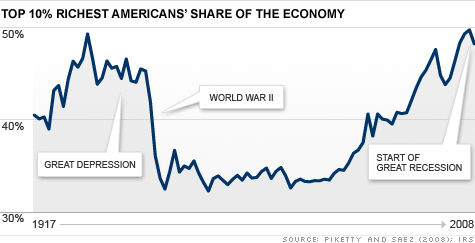Search News

NEW YORK (CNNMoney) -- There's a growing income gap in America, but it's not necessarily between the rich and the poor.
It's between the super rich and everyone else. Or as George W. Bush once quipped at a swanky campaign dinner, "the haves and the have-mores."
Income trends among 90% of Americans are relatively unchanged over the last decade. Nearly all segments of the population are moving relatively in proportion. Which is to say, they're barely moving at all.
But look at the top 10th percentile and a different story begins to emerge. The super wealthy are getting much richer, as everyone else's incomes are practically stagnant.
In 2009, the richest 10% of Americans accounted for about half the nation's wealth. Narrow that focus a bit further, and the trend is even more alarming. The top 0.1% -- those who make at least $2 million each year -- controlled 10% of the economy.
That's a far cry from the 1950s, when the suburban American dream ruled: the bottom 90% of Americans controlled about 68% of the economy.
Most research shows that a rapid rise in the top tiers of income started around the 1970s. There are various theories as to what kicked off the trend. But experts tend to agree on one thing: The continued upward trajectory for America's wealthy elite, which far outpaces that of the average American worker, was helped in large part by public policy.
"Deregulation of the financial sector seems to have created greater risk for the economy as a whole, and pushed up incomes at the top," said Jacob Hacker, Yale political science professor and co-author of the book "Winner-Take-All Politics."
Hacker argues that instead of "trickle-down economics" -- a theory that says rising wealth for those at the top eventually benefits everyone -- there's been a trickle-up effect.
The idea of deregulation gained momentum through several decades of policy put forth by lawmakers on both sides of the aisle and the Federal Reserve. As a result, the financial industry became increasingly powerful, leading to a self-reinforcing race for more profits that brought about a new era of financial innovation and extreme risk-taking.
The result was an economy controlled by the wealthy, or so-called "plutonomy," as three Citigroup analysts described in 2005.
"The world is dividing into two blocs -- the plutonomies, where economic growth is powered by and largely consumed by the wealthy few -- and the rest," the analysts wrote in a controversial research report.
But the meteoric rise of the rich took a sudden turn when the risk came crashing down in the Great Recession. At first, the wealthiest Americans appeared to be the hardest hit, with the top 1% accounting for 47% of the overall losses.
But the recession hasn't leveled the playing field, because the upper echelon was also quick to bounce back, said Ajay Kapur, the lead writer on the Citigroup report, now a managing director at Deutsche Bank.
Corporate profits returned, the public backlash against CEO pay quickly faded and and some of Wall Street's elite took home more than ever in 2010. Luxury spending did not take long to make a comeback either.
"Coming out of the recession, balance sheets of the plutonomists have recovered much more vigorously than those of other folks," Kapur wrote to CNNMoney.
Meanwhile, the real estate market has shown little signs of life since the crash, the job market has yet to fully recover and average incomes are still stagnating, keeping the American middle class far behind.
"Executives are doing well again, but the economy as a whole remains mired in unemployment and steep budget cuts at the state and local level," Hacker said. ![]()






| Index | Last | Change | % Change |
|---|---|---|---|
| Dow | 32,627.97 | -234.33 | -0.71% |
| Nasdaq | 13,215.24 | 99.07 | 0.76% |
| S&P 500 | 3,913.10 | -2.36 | -0.06% |
| Treasuries | 1.73 | 0.00 | 0.12% |
| Company | Price | Change | % Change |
|---|---|---|---|
| Ford Motor Co | 8.29 | 0.05 | 0.61% |
| Advanced Micro Devic... | 54.59 | 0.70 | 1.30% |
| Cisco Systems Inc | 47.49 | -2.44 | -4.89% |
| General Electric Co | 13.00 | -0.16 | -1.22% |
| Kraft Heinz Co | 27.84 | -2.20 | -7.32% |
|
Bankrupt toy retailer tells bankruptcy court it is looking at possibly reviving the Toys 'R' Us and Babies 'R' Us brands. More |
Land O'Lakes CEO Beth Ford charts her career path, from her first job to becoming the first openly gay CEO at a Fortune 500 company in an interview with CNN's Boss Files. More |
Honda and General Motors are creating a new generation of fully autonomous vehicles. More |
In 1998, Ntsiki Biyela won a scholarship to study wine making. Now she's about to launch her own brand. More |
Whether you hedge inflation or look for a return that outpaces inflation, here's how to prepare. More |